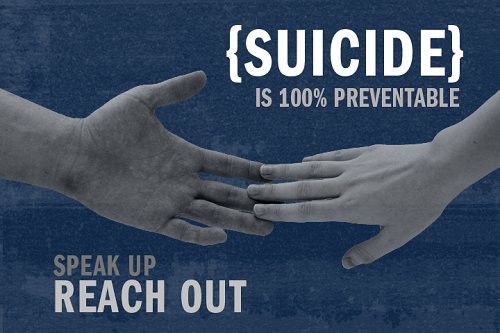The percentage of suicides in the working population is increasing at a disturbing rate. Data reveals that there is an incidence of self-killing every 40 seconds.
September 10 is observed as the World Suicide Prevention Day. It’s not every day that you discuss ways to prevent a fellow human being from throwing away his/her life in sheer desperation and doom.
In fact, many organisations wake up to the dark realities of suicide prevalence when an employee supposedly, ‘in the best of spirits’ resigns to the harshness of life by attempting to kill himself. Most of the times, such employees even succeed in this attempt. Their colleagues, managers and friends at work are left confused and in despair wondering whether they could have done something to help them out. Most are shocked at the fact that the colleague did not feel like knocking their door before taking such a drastic step. A majority of the employees contemplating suicide, display personality changes anywhere between stark to subtle. It takes some systematic dissemination of information for people to detect early symptoms of depression in co-workers. Talks on suicide and related topics sensitise and equip people ideating suicide with information on symptoms, causes and plausible options of treatment. Such talks may also act as a ray of hope for those being drawn to such intentions.
Employee counselling
A number of organisations exercise the choice of tying up with an external agency that provides professional counselling services or having a counsellor on board to handhold the employees and their families during times of crisis. In today’s times, workplaces have become a second home for employees. In fact, most of us spend more of our wakeful hours at our workplaces and/or with our colleagues. Thus, we are slowly becoming a part of a global family called the workplace. It is only imperative that individuals are provided a platform where they feel safe to share their deepest fears and problems, and also seek an empathetic ear to help them move towards solving rather than running away from life issues. Many companies, such as the Mahindra Group and the Tata Group to name just a few, have consistently provided employees an opportunity to meet professional counsellors and seek advice.
Creating peer counsellors
While professional counselling is the most preferred mechanism of addressing emotional issues, some employees hesitate to avail of these facilities due to the fear of social ridicule. They would rather open up in front of a fellow employee whom they trust than talk to a professional. However, a colleague who is neither trained nor equipped to deal with distress, anxiety and depression-related issues may do more harm than help in such cases. This brings forth the concept of Peer Counsellors, an initiative tried out in organisations, such as BPCL and Godrej. Employee volunteers who show the ability to empathise with others and express willingness to provide emotional first aid to fellow employees are identified. They are then provided basic training in certain fundamental counselling skills, such as rapport building, probing and problem solving. While the idea is not to project them as substitutes for mental health professionals, they become very effective agents for early detection and referral.
Ready information of help lines
The welfare or the HR department can collate information of helplines, such as Samaritans, Maitra and others that specialise in providing telephonic counselling to people in distress. Such information can be posted on the company’s website so that it is easily available to one and all.
Health Check ups
While most organisations facilitate health check-ups for executives and other employees, the reports should also be assessed for a plausible impact on mental health. For example, low D3, B12 and thyroid levels in blood are linked to the experience of depression, making a person more vulnerable to suicidal ideations. Timely guidance from a nutritionist can also help people take a balanced diet ensuring better levels of these blood parameters and therefore, a better body–mind synergy.
Mental health status check
Many organisations focus on collecting relevant employee data for better planning and workforce management. A vital piece of information that organisations can aim to collect is the mental health status using some standardised surveys to capture stress levels, personality dispositions and attitudes that can identify people at risk.
Managing critical talent is always the mandate of organisations. It’s time that organisations broaden their definition of critical talent to include those who are high risk and commit themselves to fulfil their social responsibility of saving, nurturing and protecting this talent.
(The author is a consulting psychologist and Faculty of HR and Soft Skills at IBS Business School, Mumbai.)




1 Comment
Very well structured article.
In addition to Peer Councilling.
Senior Employees who are normally in Mentor roles for junior young employees can also contribute to destressing Young employees who are under tremondious pressures at work place (Professionally – work, bosses, peer & Socially – Locality, Community, Friend Circle, Relatives in Family etc.
These senior Employees could help as fatherly (Parent like) support.